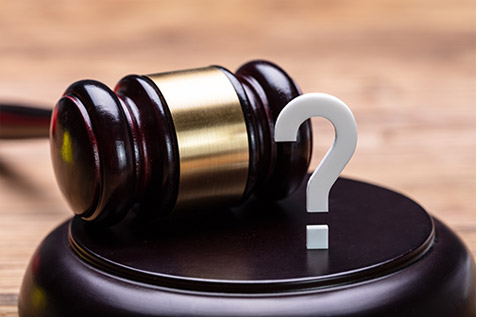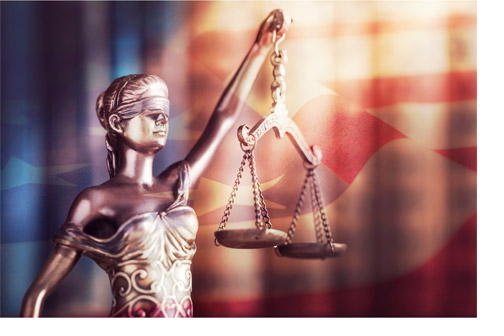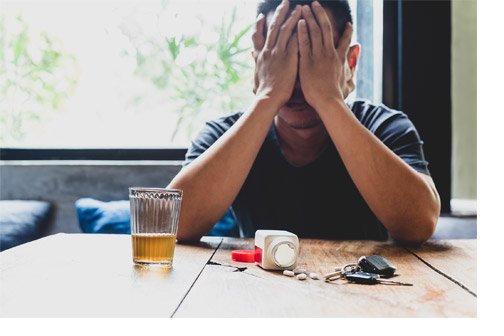I’m John Barrett. I am a criminal defense lawyer. I have defended people since 1985 and it has been at least 95% of my work since then. I am certified as a specialist in North Carolina Criminal Law.
Take a look around this website, give us a call, and we’ll sit down and talk.
I have some suggestions and am including some information that may apply to your situation. I’m speaking from my experience in this section, but I believe that these things apply in general:
Rule 1. Get a Lawyer, of course. After getting a lawyer…….
Rule 2.Tell your lawyer everything. Even a very good case has a few things that aren’t helpful. My knowing about those things in advance and being able to plan ahead may make a big difference in dealing with them.
 Ask your lawyer questions, ask questions, ask questions……. It will help you understand events as they come up and have expectations that are in line with the possibilities of your case. It’s easy to go into a case with assumptions that turn out to be inaccurate and you don’t want that to happen to you. Think about it the same way that you would if your doctor told you that you had a particular disease. You’d hope that you had confidence in your doctor, but you would still want to know about the disease, it’s treatment and the possible outcomes. You may well find yourself getting a lot of information or advice from people who don’t work in the court system. Even when these folks are smart and well meaning, what you hear is only a little more than 50% likely to be accurate. One reason for this is that the law and the court system are often more complicated than people realize. For example, you have probably heard of people being advised of their rights by a law enforcement officer. These are known as Miranda rights and begin: “You have the right to remain silent….” Some people believe that, if they were not read those rights, the charges have to be dropped. I wish. They only apply when a person has been arrested or restrained as if they were being arrested. They only apply when the person says something in response to questioning by a law enforcement officer(s). If a person’s Miranda rights are violated and they have said something incriminating after they should have been read their rights, what the person said can’t be used against them. There is no rule requiring that the charges be dropped. There are more complications to this issue, but you get the idea.
Ask your lawyer questions, ask questions, ask questions……. It will help you understand events as they come up and have expectations that are in line with the possibilities of your case. It’s easy to go into a case with assumptions that turn out to be inaccurate and you don’t want that to happen to you. Think about it the same way that you would if your doctor told you that you had a particular disease. You’d hope that you had confidence in your doctor, but you would still want to know about the disease, it’s treatment and the possible outcomes. You may well find yourself getting a lot of information or advice from people who don’t work in the court system. Even when these folks are smart and well meaning, what you hear is only a little more than 50% likely to be accurate. One reason for this is that the law and the court system are often more complicated than people realize. For example, you have probably heard of people being advised of their rights by a law enforcement officer. These are known as Miranda rights and begin: “You have the right to remain silent….” Some people believe that, if they were not read those rights, the charges have to be dropped. I wish. They only apply when a person has been arrested or restrained as if they were being arrested. They only apply when the person says something in response to questioning by a law enforcement officer(s). If a person’s Miranda rights are violated and they have said something incriminating after they should have been read their rights, what the person said can’t be used against them. There is no rule requiring that the charges be dropped. There are more complications to this issue, but you get the idea.
You are probably aware that the State has to prove it’s case beyond a reasonable doubt. In sum, for a conviction, the State’s proof has to be strong enough to leave the judge or jury deciding the case “fully satisfied or entirely convinced of the defendant’s guilt”. You might also be aware that a Defendant is not required to testify or put on other evidence. The natural question that follows is: “Don’t they think that you’re guilty if you don’t testify?”. The law says no. Juries are told this explicitly and directly and judges know this. OK, “Is the law followed by juries?” A judge I knew to be a wise judge addressed this at a seminar when I was a young lawyer. He said that juries would respect a Defendant’s right not to testify and not hold that against the Defendant when the Defendant didn’t put on other evidence. I no longer have to take the judge’s word for this. Quite a few juries in my trials have proven this to be true. (That judge and I wouldn’t be as confident when a Defendant doesn’t testify but does call other witnesses.) The same law applies, of course, when a judge decides a case. It isn’t unusual to for the best defense for a case to be challenging the State’s case without putting on defense witnesses. One thing that this leads to is that criminal cases are often not about who has the best evidence. The first, and maybe only, fundamental issue is what the State might or might not be able to prove to a judge or jury. It also means that my believing my client is innocent or guilty is not the point. It is my duty to fight as hard for a client I believe to be guilty as for one who I believe to be innocent and I do that. I can’t and don’t, call my client or anyone else as a witness if I expect they would lie. (Apart from the obvious ethics of that situation, that, just by itself, can cause the defense of a case to crash and burn.) Trials are about whether or not the State proves it case. If not, the Defendant is entitled by law to a verdict of Not Guilty and it’s my job to do everything within the law to get that verdict.
 Court Scheduling is pretty much out of the defense lawyer’s control. Starts and stops are typical. The progress of your case may be quicker or slower than we would like. The case may or may not be resolved on the next Court date. There are likely to be times when we are waiting on things not within your or my control. It then may be that the case accelerates rapidly and does so without any particular warning. Although it’s nothing for anyone to brag about, that’s just the way the system is. The way to respond is for us to be sure that we are prepared and have done what we are able to do to be ready when the case gets moving. My suggestion is that you take some time during a slow period and think if you have a good understanding of what happened, what may be happening and what can be predicted or estimated about what is going to happen. Helping you with that is definitely covered by your fee and I want you to know and understand what we can know or estimate. Call the secretaries, get a time to come by the office and I’ll be glad to take the time that we need for you to have as clear a picture as is possible.
Court Scheduling is pretty much out of the defense lawyer’s control. Starts and stops are typical. The progress of your case may be quicker or slower than we would like. The case may or may not be resolved on the next Court date. There are likely to be times when we are waiting on things not within your or my control. It then may be that the case accelerates rapidly and does so without any particular warning. Although it’s nothing for anyone to brag about, that’s just the way the system is. The way to respond is for us to be sure that we are prepared and have done what we are able to do to be ready when the case gets moving. My suggestion is that you take some time during a slow period and think if you have a good understanding of what happened, what may be happening and what can be predicted or estimated about what is going to happen. Helping you with that is definitely covered by your fee and I want you to know and understand what we can know or estimate. Call the secretaries, get a time to come by the office and I’ll be glad to take the time that we need for you to have as clear a picture as is possible.
Let’s face it, good lawyer, bad lawyer or no lawyer, the ending of a criminal case or set of cases that occurs most often is a guilty plea. You’ll see this if you spend even a little time in court. One reason for this is the tendency for sentences or other penalties that come after a guilty plea to be less than they would be after a trial and Guilty verdict. In addition, a Guilty verdict, statistically speaking, is the more common result of a trial. This definitely doesn’t mean that everybody should plead guilty. It’s not about me, it’s about you, but if my clients always had to plead guilty, it would really take away from me liking what I do. Neither pleading Guilty or Not Guilty is my mindset at the beginning. Each case is different and, simply, I think about a case and weigh the options. I make my evaluation as to what would or could happen at the end of a trial. With or without a plea bargain offer, I compare that to what would or would most likely happen after a guilty plea. Then, with this guidance, my client decides whether to go to trial or plead guilty and I am behind them either way.
It’s not personal with prosecutors, judges or law enforcement officers. When you think about it, you don’t want me to cuss these people out. It is also not about me jumping up and down or banging my shoe on the table. Instead, being a grownup is the best way to persuade people, both jurors and others. There are only a few occasions when the thing to do is to get loud. What works is to be clear, to be firm, and to be thinking about what to say and how to say it. I don’t need to tell you that people will listen to and consider what you say better if you haven’t just attacked them personally.
 Should you go to rehab? If you’re asking yourself this question, I’d suggest that you give it some more thought. If you have a problem with substance abuse, it’s like other problems; you’re better off knowing about the problem than not knowing. A useful experiment would be to stop using alcohol and drugs for a period of time. If you were able to stop, that’s great. You’ll might well feel better and want to keep going that way. If you can’t, please keep reading. A particular type of client meeting has repeated itself over the years. My describing this type of discussion that I’ve had with some of my clients might help you understand the issue. It comes up when I am discussing a case in depth with a client, often when we are doing that for the first time. In the situation I’m thinking of, it turns out that the client is guilty of at least part of what he or she is charged with. This often becomes clear because they tell me so. As we go through the discussion of the case, it also becomes clear that what the person did was not at all smart. It should have been easy for a grown man or woman to see that what they did was definitely not a good idea and would likely wind up as harmful to themselves. It also becomes clear that the client or potential client seems to have a good head on their shoulders and be able to use good judgment. At this point, I’m ready to bet money that they have a substance abuse problem and wouldn’t be in trouble if they didn’t. I’ve long since concluded that substance abuse leads smart people to do dumb things and good people to do bad things.
Should you go to rehab? If you’re asking yourself this question, I’d suggest that you give it some more thought. If you have a problem with substance abuse, it’s like other problems; you’re better off knowing about the problem than not knowing. A useful experiment would be to stop using alcohol and drugs for a period of time. If you were able to stop, that’s great. You’ll might well feel better and want to keep going that way. If you can’t, please keep reading. A particular type of client meeting has repeated itself over the years. My describing this type of discussion that I’ve had with some of my clients might help you understand the issue. It comes up when I am discussing a case in depth with a client, often when we are doing that for the first time. In the situation I’m thinking of, it turns out that the client is guilty of at least part of what he or she is charged with. This often becomes clear because they tell me so. As we go through the discussion of the case, it also becomes clear that what the person did was not at all smart. It should have been easy for a grown man or woman to see that what they did was definitely not a good idea and would likely wind up as harmful to themselves. It also becomes clear that the client or potential client seems to have a good head on their shoulders and be able to use good judgment. At this point, I’m ready to bet money that they have a substance abuse problem and wouldn’t be in trouble if they didn’t. I’ve long since concluded that substance abuse leads smart people to do dumb things and good people to do bad things.
If you think you might be like these people, there’s good news and bad news. The bad news is that, if you aren’t able to lick the problem, you’re in the first or early chapters of a fairly long book of ongoing troubles. Even if you’re a person of good moral character, it is, sadly, still the same book. The good news is that, if you lick the problem by learning how you, instead of alcohol or drugs, can run your life, your life will get a whole lot better. It may well also help your case. In the long term, the verse “And ye shall know the truth, and the truth shall make you free.” describes admitting to yourself that you have a substance abuse problem very well.
It’s necessary to realize that it may be very hard. Getting well, though, is worth every bit of it. People have come back from very, very dark places in their lives. They continue their recovery and live lives that are good for them and the people around them. It’s an ongoing process. Millions of people around the world have and are doing it every day.
Let’s talk about the situation; I’ll probably have some ideas. When we talk, keep in mind that what you tell me is confidential and that I’ve already heard, and kept, a lot of deep, dark secrets. Remember, also, that I’ve chosen the role in the legal system where, if someone stands judgment over another person, I’m not the one doing that.